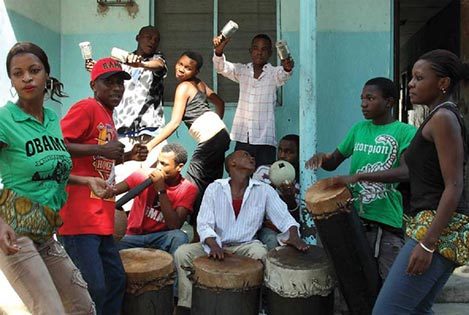Super Maya Baikoko
Country Tanzania Genres roots traditional Festival Sauti za Busara 2013 Baikoko has recently become one of the most favoured night entertainments around Dar es Salaam. Baikoko groups play in roadside bars, at weddings or as an added attraction for ‘modern taarab’ nights. The young man who started this recent craze is Juma Hussein, also known as “Maya”.
Baikoko originated in the Digo villages around Tanga in the early 1990s. There it had evolved out of a number of older Digo traditional drumming genres like gita, chera and mdindiko. Baikoko grew directly out of the latter from which it inherited the long msondo drum, shakers and mabuyu, kind of trumpets originally made out of gourds. To the original drum line-up Baikoko added an array of dogole, three bass-type drums, that guide the dancers.
The dance style is directly linked to the ngoma ya ndani, an exclusive women-only dance, formerly only practised “inside” (as the name suggests) not intended to be seen by men. Ngoma ya ndani is known among all the Mijikenda people down the Swahili coast from the Bajuni to the Digo, elsewhere it can be likened to msondo or unyago, part of the initiation of girls into adulthood.
Baikoko was first seen in the Kisosora area of Tanga town and performed by a group called Bazoka. In town now the instrumentation stayed the same but changed face by being adapted to materials available in the city. Thus the drums are now made from plastic drainage pipes of varying sizes, the maboya from buoys otherwise used in port to guide ships, the rattles are made from empty tins.
Maya had been a singer of various ngoma styles in his home village of Pangarawe. He moved to Tanga and became a member of Bazoka in the late 1990s. However, the group split as rivalries developed among the singers and Maya went on to form Channel O with some of the current members, including Kwini, the unrivalled queen of the slow Baikoko grind.Channel O went on to win a number of Baikoko contests organized in Tanga town in the early 2000s. In Ramadhan of 2009 Maya went to stay with his brother in Dar es Salaam, as no music is performed throughout the holy month of fasting. He intended to work and make some extra money before moving back to Tanga for the Idd holidays. One day he saw a discarded plastic pipe on a rubbish dump and had the idea to start a Baikoko group right there in Dar once the month of Ramadhan had ended. His brother helped him get more of the necessary pipes and to bring in some of the musicians from his former band in Tanga.
Baikoko took the Magomeni area of Dar es Salaam by storm and Maya & his group Dogo Dogo Stars soon had more gigs than they could cope with. The huge success inevitably created some problems among band members and the group soon started to splinter into branches as individual members were lured away to join different groups. Thus Baikoko is currently played and danced by many groups in Dar es Salaam and the fanbase has widened to Zanzibar and Mombasa. Yet Maya and friends, now performing as Super Maya Baikoko, are still the strongest group around.
(text: Werner Graebner/Jahazi Media)
Algeria Angola Australia Austria Benin Burkina Faso Burundi Cameroon Canada Cape Verde Comoros Congo Côte d'Ivoire Denmark DRC Egypt eSwatini Ethiopia Far East Finland France Gambia Germany Ghana Guinea Guinea Bissau Iraq Japan Kenya Lesotho Madagascar Malawi Mali Mauritania Mauritius Mayotte Morocco Mozambique Namibia Netherlands Nigeria Norway Pan Africa Pemba Puerto Rico Reunion Rwanda Senegal Seychelles Somaliland South Africa Sudan Suriname Sweden Switzerland Tanzania Uganda UK USA Various Yemen Zambia Zanzibar Zimbabwe
acoustic acrobats afrobeat band blues bongo flava coastal comedy dance dj electro fusion hiphop jazz kidumbak pop reggae rock roots rumba spiritual spoken word taarab traditional urban zenji flava


 Kwa kiswahili bofya hapa>>>
Kwa kiswahili bofya hapa>>>